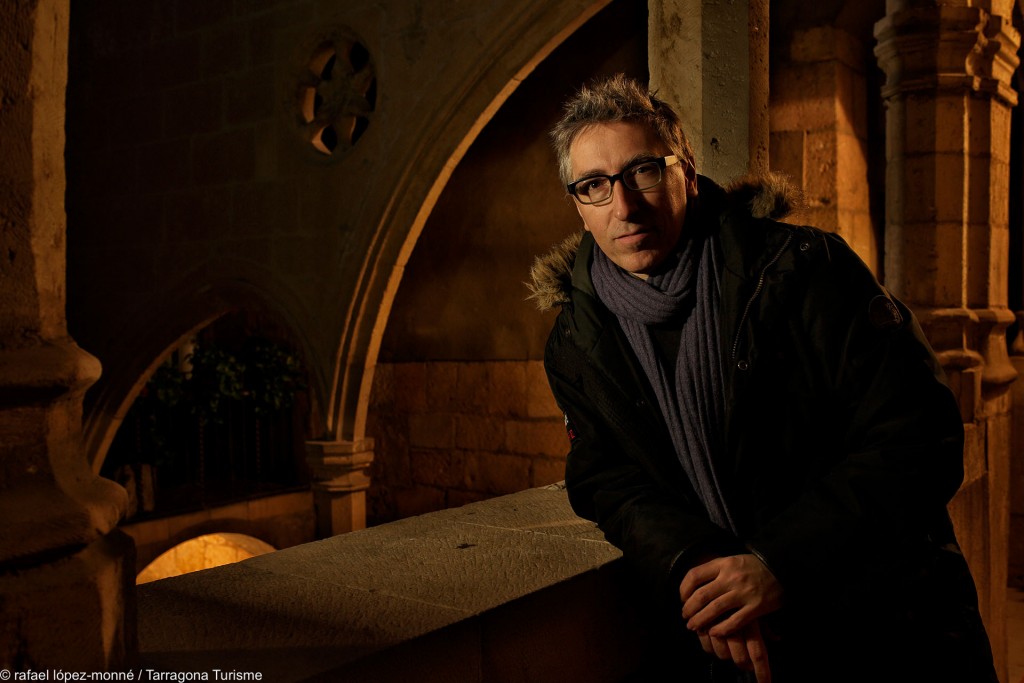
Tarragona, Tarragons, Tarragona
“We are past, we are present, we are future…“. From the very harrow of the amphitheatre, David Trueba dreamy contemplates the starlings’ flight that covers the sky. It’s a generation’s claim, which rises from the trench and asserts the memories of the city.
Trueba, a versatile creator, visits Tarragona to present his very last novel, ‘Blitz’ (Anagrama, 2015), a brief and vibrant account where time is transcendental. The action takes place in Munic, a city, which values the history and where the previous symbolism is part of the daily basis of the people. Before presenting the book, the author stops in front of the amphitheatre and watches the grandstands and, at the foreground, the sea. He is accompanied by Tarragona Tourism and Tarragona Film Office people in charge, an office created by the Mayor House to promote the setting and audio-visual products.
The roman building, an antique theatre, which represents the public life in Tarraco, inspires the most visionary part of David Trueba. It flourishes the conscious sensitivity that the Madrid-born author brings in his work, and with which he has obtained recognition both in the cinema as in his novels. “The intense relationship between the Antiquity and the modernity perceived in Tarragona is the perfect expression of how human experience is built in by layers, one on another. Sometimes the present time succeeds in standing out but, with perspective, we would find plenty of generations as ours who have lived their moment and have actually found the light“, he reflects.
David Trueba doesn’t know Tarraco Viva, even though his way of interpreting what happens worldwide agrees with the Roman festival of Tarragona’s postulates: to know the past to analyse the present. What this director does not overlook are the presentations offered by the city as a cinema set. On 2002, the youngest of the Trueba siblings already filmed in the port a scene of the “Salamina’s Soldiers“, a film which would end chosen as the Spanish representation for the Oscars Awards.
The hours of sunshine as well as the particular light of Tarragona have attracted many film teams for the last years. However, on that April Saturday in which Trueba came to work in the city, the sky was not only covered, but it was also raining. His memories about that day are precise, as his talent to connect with the public while narrating stories full of humanity. “Emilio Ruiz del Río made a ship mock-up and we filmed while it was setting sail from the port, which represented that of Barcelona. Everyone was complaining about the rain but me, since it was what I wanted” he remembers.
His last projects have had unanimous critics and sells, but it is clear that what Trueba is interested in isn’t what common people do. The director turns down the crowd, and he enjoys the beach mostly in winter. Since he was a child he has subscribed clever pleasures, such as listening to music, going to the cinema or reading a lot, hobbies that have actually awakened this intellectual curiosity and enriched his creative and nonconformist spirit.
He has a sundry of projects and barely has time to get some holidays, but every year he enjoys some days of relax with his family, in Cantabria. In fact, many of his original stories, which appear as his stamp in scripts and novels, are inspired in stories that he has eventually lived or that have been tricked by his inner circle. The guy who escapes from the house in the so awarded “Living is easy with the eyes shut” (awarded with a Goya prize in 2013 for the best original script, best film and best director) is indeed inspired in the struggle which one of his siblings had, who also escaped from home to avoid getting his hair cut.
Trueba monitors the Part Alta. He steps on the history, as he says, and he focuses on the way of living of Tarragona’s inhabitants; he has the opportunity to enter the Palau de la Cambreria’s patio, the magnificent gothic building attached to the Cathedral. “You live in a beautiful city and I love the fact that you defend it proudly. I will come to film someday“, he states, afterwards, to the large public attracted by the presentation of his book.
Text: Oriol Margalef (@OhMargalef on Twitter)
Photo: Rafael López-Monné (@lopezmonne on Twitter)
Translation: Aina Rodon (@ainarodoncasale on Twitter)



